Card games are fun and usually fast-paced. They are fun for friends and family as the gameplay usually involves a lot of player interaction such as dealing, exchanging, passing and taking of cards.
Find your next family card game with our recommended card games list.
Targi
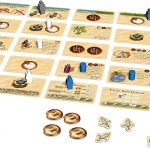
Theme and overview:
Unlike in other cultures, the desert Tuareg men, known as Targi, cover their faces whereas women of the tribe do not wear veils. They run the household and they have the last word at home in the tents. Different families are divided into tribes, headed by the ‘Imascheren’ (or nobles). As leader of a Tuareg tribe, players trade goods from near (such as dates and salt) and far (like pepper), in order to obtain gold and other benefits, and enlarge their family. In each round their new offerings are made. Cards are a means to an end, in order to obtain the popular tribe cards.
Gameplay:
The board consists of a 5×5 grid: a border of 16 squares with printed action symbols and then 9 blank squares in the centre onto which cards are dealt. Meeples are placed one at a time on the spaces at the edges of the board (not including corner squares). You cannot place a meeple on a square the opponent has a meeple on already, nor on a square facing opponent’s meeple. Once all meeples are placed, players then execute the actions on the border squares the meeples are on and also take the cards from the centre that match the row and column of the border meeples.
The game is predominantly scored and won by playing tribal cards to your display. These give advantages during the game and victory points at the end. Usually cards are played (or discarded) immediately once drawn. A single card can be kept in hand but then requires a special action to play it (or to discard it to free the hand spot for another card). Each card has a cost in goods to play. Goods are obtained either from border spaces or from goods cards.
The display (for scoring) consists of 3 rows of 4 cards that are filled from left to right and cannot be moved once placed (barring some special cards). There is also a balance to be found between the victory point score on the cards themselves (1-3 VP per tribal card) and in the combinations per row (a full row of 4 identical card types gets you an additional 4 VP, and a full row of 4 distinct card types gets you 2 VP).
The winner at the end of the game is the player with the most victory points.
[amazon box=”B07B7TTRDF”]Chez Geek
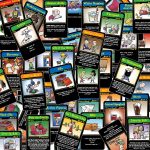
Chez Geek is a humorous, and fast-paced card game. Players are roommates trying to get through life with as minimal work.
Each player is given a Job card which states:
- their free time,
- income,
- a special ability and
- their Slack goal.
Players are also dealt five Life cards. The space directly in front of a player represents their Room, where cards will be played during gameplay.
Players take turns to
- Draw Life cards
- Make “variable” rolls.
For each unit of free time the player’s Job card gives them, they may perform one action or go shopping.
At the end of a turn, if a player has more than five cards in hand, the player must discard cards until they have five or fewer. If desired, players can discard all the way down to one card. (NOTE: It is also legal for a player to play ALL the cards in their hand and have NO cards at the end of a turn.)
Activity cards and Thing cards typically list a Slack value which is added to the player’s Slack total, though some have random Slack totals and some have Slack totals which vary during the game.
The first player to achieve or exceed their Slack goal is the winner.
[amazon box=”B003B9EBM0″]Cthulhu Fluxx
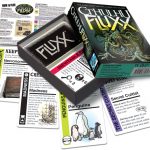
A card game that involves one basic rule: Draw one card, Play one card. Players start their hands with three cards.
They then add the card they drew to ther hand, and then choose one card to play, following the directions written on your chosen card.
As cards are drawn and played, the rules of the game change based on:
- how many cards are drawn,
- played or even how many cards you can hold at the end of a player’s turn.
To win in Fluxx, a player has to meet the conditions set forth on the current Goal. Although there are some unusual goals out there, most of the time a Fluxx Goal will require you to have a particular combo of cards.
[amazon box=”193611237X”]Rook
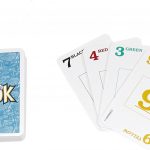
Rook has a specially designed 57-card deck where there are four suits in this deck: red, green, black, and yellow, and the numbers on the cards range from 1 to 14. The Rook card, with the picture of a bird, is a high-point card.
Rook involves bidding and trick-taking. The object of the game is to use your cards in your hand to score as many points as possible.
Cards are accordingly:
- 5 = 5 points
- King, 10, and 14 = 10 points
- Ace = 15 points
- Rook = 20 points (counts as extra trump)
- Winning the last “trick” = 20 points
On each hand, you can score up to 200 points. Players decide beforehand how many points they would like to play towards. It is common to play to 1,000 points.
Partners sit across from each other and attempt to bid the minimum value of points a player and their partner will score by end of the game.
Players and their partners must be careful not to bid too high, as they will lose if they go over the total amount scored. When bidding, players can’t see their partner’s hand, and the bid is based on both the player and partner’s hands.
When the bidding is over, the winner of the bid takes the card from the center and returns a card from his hand face-down in front of him or her. The winner can return the original card that he or she pulled from the center if it is not useful to his or her hand. The winner and his or her partner keep any points that this dropped card is worth.
[amazon box=”B00NQQTZ5G”]Five Crowns
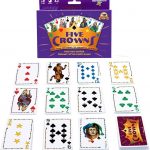
Five Crowns is a rummy-style card game where players compete to have the lowest point total after completing eleven hands. Five Crowns uses a card deck with 5 suits, and in each hand, players are dealt the following number cards: 3 for the first hand, 4 for the second hand, up to 13 for the 11th hand. The game also uses both jokers and wild cards. The goal for each player is to play out their hand by creating sets or runs. The winner of the hand scores zero points, whereas all other players score points based on the cards remaining in their hand. Once the points are tabulated, all cards are shuffled and the next hand is dealt.
[amazon box=”B00000IV35″]Phase 10
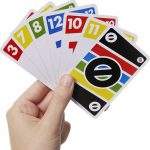
‘Phase 10’. This rummy-style card game is not just about luck; it’s about strategy, patience, and a bit of competitive spirit.
Phase 10 Gameplay and Mechanics
The objective of ‘Phase 10’ is to complete ten specific phases, each with its own set of requirements. These phases range from collecting sets of the same number to gathering runs of consecutive numbers. Each player works through these phases in order, but the catch is, you can’t move to the next phase until you complete the current one.
The game starts with each player being dealt a hand of cards. On your turn, you draw a card and discard one, aiming to complete the phase you’re on. Once you lay down your completed phase, you try to “go out” by playing off your remaining cards on your own or other players’ laid-out phases.
The first player to complete all ten phases wins, but the game can twist and turn unexpectedly, making for some thrilling moments.
Who is Likely to Love ‘Phase 10’?
- Families: ‘Phase 10’ is fantastic for family game nights. It’s simple enough for kids to understand (recommended for ages 8 and up), but also engaging enough for adults.
- Casual Gamers: If you’re not into heavy strategy games, ‘Phase 10’ offers a perfect balance of luck and strategy without being overwhelming.
- Party Goers: It’s a great game for social gatherings or parties. The rules are straightforward, making it easy for newcomers to join in.
- Rummy and Sequence Fans: If you love card games like Rummy or Sequence, ‘Phase 10’ provides a familiar yet unique twist.
What Makes Phase 10 Fun?
- Easy to Learn: The rules are simple, making it easy to get new players involved quickly.
- Strategic Play: While luck plays a role, strategic discarding and playing can give you an edge.
- Social Interaction: The game encourages interaction, laughter, and a bit of friendly competition, making it a great social game.
- Variability: No two games are the same. The order in which phases are tackled and the play styles of your opponents keep the game fresh and exciting.
Walking in Burano
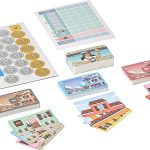
Burano is an island in Venice, Italy, famous for colourful houses. The theme of this game revolves around the island, which has vibrant houses on both sides of the canal, as well as the personal décor placed by the people on the island. The houses need a fresh coat of paint in order to remain beautiful and vivid. Players use their creativity to refurbish and decorate the houses and attract tourists and local people.
To beautify these houses, players place Floor Cards on the game area to attract visits from different characters.
They will score points based on the various symbols on these cards. Players compete to score the most points.
Startups
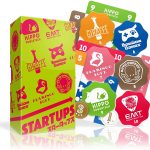
There are six companies that will change the world! You can invest in them and become rich by making the right decisions!
Only the biggest investor receives money out of each company. Players try to read the next steps of their rivals and use their capital and three hidden cards to win against them and become the biggest shareholder!
You have to be lucky but you must also think about your moves and analyze your rivals!
[amazon box=”B07GS8ZY4Y”]